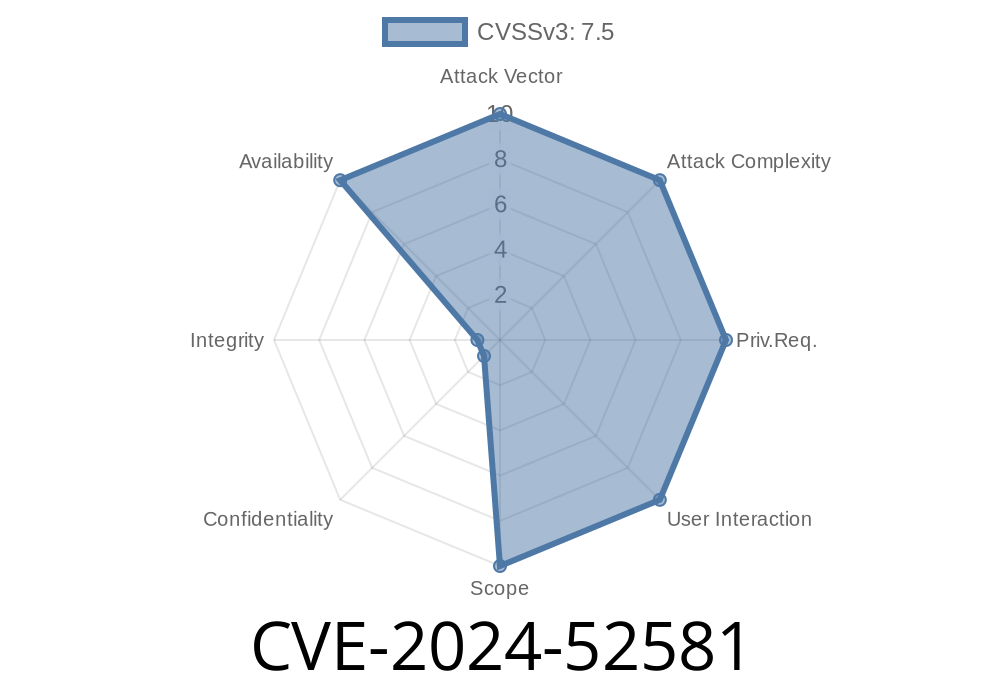The internet is built on frameworks that make services fast and easy. But even slick web backends like Litestar—an increasingly popular ASGI (Asynchronous Server Gateway Interface) framework for Python—can have security gaps. One such issue is CVE-2024-52581, a denial-of-service vulnerability that allows malicious actors to crash Litestar-powered servers by sending massive file uploads. In this post, we’ll break down what went wrong, show you example code, point out the dangers, and share how to stay protected.
What is CVE-2024-52581?
CVE-2024-52581 is a critical vulnerability in Litestar (before version 2.13.) affecting how the framework handles multipart/form-data uploads. In simple terms, the server expects the whole request body—the actual upload content—as a single chunk of memory (a “byte string”), and there’s no default size limit. That means someone could send a monster file—hundreds of megabytes, or even several gigabytes—causing your server to gobble up all its memory and eventually crash. No hacking expertise needed: just a file upload, and your web app is toast.
This isn’t just a theoretical risk; it’s very easy to exploit. It’s a textbook denial-of-service (DoS) attack.
How It Works: The Multipart Form Parser
Multipart forms are everywhere—they’re what your browser uses when you submit that “choose a file” field on a web page. Here’s the trouble spot: Litestar uses a parser that expects to get all of the upload data at once as a single byte string, even if the file is huge.
Here’s a simplified view of what happens inside affected versions (pre-2.13.)
# Vulnerable code snippet (simplified example)
from litestar import post, Litestar
from litestar.datastructures import UploadFile
@post("/upload")
async def upload_file(data: UploadFile) -> dict:
# The entire request body is read into memory here!
content = await data.read()
return {"filename": data.filename, "size": len(content)}
app = Litestar([upload_file])
With this API endpoint, any file upload—no matter how large—will be read entirely into memory at once. There’s nothing stopping a user from uploading a 5GB file. The server, in turn, will attempt to ingest the whole 5GB in RAM. If your server only has 2GB free? Boom—Python throws an OOM (out-of-memory) error, and your app is offline.
Why Simple Limits Don’t Work
Some frameworks or developers try to work around this by limiting the number of parts (files and fields) in a multipart upload. But for Litestar’s vulnerable parser, that won’t stop the problem, because a single giant file is still a single part—a single part you have to store in RAM.
Worse, there’s no stream processing here. It’s not reading and saving chunks to disk, or even to temporary files; everything comes in at full tilt, in memory.
Previous Vulnerabilities and Regressions
It’s significant to note that this isn’t Litestar’s first run-in with this type of bug. A similar issue was reported and patched last year as CVE-2023-25578. But somehow, the problem returned—a regression, meaning a previously fixed bug resurfaced, often by accident in later code changes or refactoring.
Anyone can slam your Litestar server with this DoS attack. Here’s how simple it is
1. Craft a multipart POST request with a huge file—something you can create easily with curl or requests in Python.
2. Send the request to any route that processes multipart uploads (like /upload in our example).
Example: Simulating the Exploit With Curl
Let’s say you want to test this locally (don’t do this on real production servers!).
`bash
dd if=/dev/urandom of=bigfile bs=1M count=2048
`bash
curl -F "data=@bigfile" http://localhost:800/upload
`
If the server is running an unpatched version of Litestar, it will attempt to process this in memory, stalling or crashing due to exhaustion.
The Fix — And How You Can Stay Safe
The Litestar team released version 2.13. with a patch for this issue. The fix makes the parser smarter about request size and adds limits.
Upgrade Litestar
pip install --upgrade litestar
Official References
- GitHub Security Advisory for CVE-2024-52581 *(exact ID may change as advisory numbers are updated by GitHub)*
- Litestar changelog v2.13.
- NVD CVE-2024-52581
For more details on the previous, similar issue see:
- CVE-2023-25578
Conclusion: Don’t Let This Be Your Problem
Denial-of-service vulnerabilities like CVE-2024-52581 are particularly nasty because they’re so cheap to exploit—no fancy skills needed, just a big enough file. If you’re running Litestar in production, double-check your version *today*, and upgrade if you’re not on at least 2.13.. And remember: any web server accepting uploads is potentially at risk if upload size isn’t well managed.
Stay safe out there—because sometimes, the biggest threats are just “too much data, all at once.”
*This post is exclusive to your feed. Please share responsibly!*
Timeline
Published on: 11/20/2024 21:15:08 UTC
Last modified on: 11/25/2024 14:15:07 UTC
